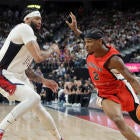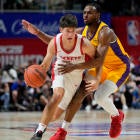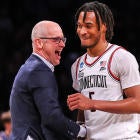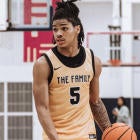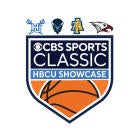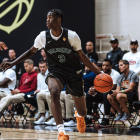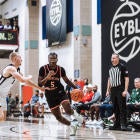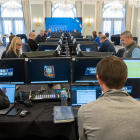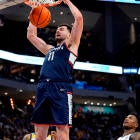The NCAA's long-running investigation into allegations that paper classes benefited student-athletes at North Carolina has come to an end. In the NCAA Committee on Infractions report released Friday, UNC athletics wasn't explicitly implicated and there was no specific connection in the scandal that benefitted only student-athletes.
"While student-athletes likely benefited from the so-called 'paper courses' offered by North Carolina, the information available in the record did not establish that the courses were solely created, offered and maintained as an orchestrated effort to benefit student-athletes," Greg Sankey, the panel's chief hearing officer and commissioner of the SEC said in the report. "The panel is troubled by the university's shifting positions about whether academic fraud occurred on its campus and the credibility of the Cadwalader report, which it distanced itself from after initially supporting the findings. However, NCAA policy is clear. The NCAA defers to its member schools to determine whether academic fraud occurred and, ultimately, the panel is bound to making decisions within the rules set by the membership."
Here's a timeline of the NCAA's investigation of UNC which was set in motion in 2010 and culminated with the news that dropped Friday.
July 2010: A tweet sent out by UNC football player Marvin Austin triggers an NCAA investigation into agents providing financial benefits to players. The investigation also finds that a former tutor provided improper help on papers for football players.
July 2011: Dismissed UNC football player Michael McAdoo sues to rejoin team, but in his efforts he makes public a term paper that is found to have been heavily plagiarized. Chairman of the African and Afro-American Studies department, Julius Nyang'oro, is identified as the instructor.
August 2011: A transcript for football player Marvin Austin shows he received a B+ in an upper level African studies course the summer before his first full semester began as a freshman. Nyang'oro is listed as the instructor.
September 2011: UNC announces Nyang'oro's resignation as department head. The school also launched an investigation into what it called academic "irregularities."
May 2012: UNC releases a report that unearthed 54 classes over a four-year span had little to no instructional contact. The report found a high percentage of Nyang'oro's courses in which temporary grades were converted to permanent ones. UNC deems the findings an academic issue, not an athletics issue, as both student-athletes and non-student-athletes were given the same treatment in the fraudulent courses.
June 2012: Records show that a large majority of enrollments in the nine most suspect classes at UNC were filled with football or basketball players.
August 2012: UNC announces the NCAA sees no apparent violations related to academic fraud.
September 2012: Records show athletes struggling academically were steered to classes that were easy and did not meet.
November 2012: Whistleblower Mary Willingham, a former learning specialist for athletes, goes public and says UNC was using paper classes to keep struggling athletes eligible
November 2013: UNC releases emails indicating that the NCAA still sees no evidence of any violations
January 2014: The New York Times publishes a front page story on the academic scandal, which launches a nation-wide onslaught of headlines in the days that followed.
February 2014: UNC announces a new investigation led by Kenneth Wainstein, a former top U.S. Justice Department official.
June 2014: Rashad McCants tells ESPN that counselors steered him to participate in fraudulent classes to maintain their eligibility.
June 2014: UNC announces the NCAA has decided to reopen an investigation into the school and alleged academic fraud.
October 2014: Wainstein's investigation finds there was pressure from the athletes' tutoring program that prompted the academic fraud -- a finding that directly goes against UNC's longstanding claim that the fraud wasn't rooted in athletics.
May 2015: NCAA sends UNC a NOA claiming UNC committed three major violations by allowing the academic support program to create special arrangements for student athletes.
June 2015: UNC releases the NOA and 730 pages of exhibits 15 days after receiving them and making redactions.
August 2015: UNC announces it has submitted new information to the NCAA amid the ongoing NCAA investigation into the academic fraud. The response came just four days before the school's response to the NOA had been due, temporarily putting a hold on the case as UNC awaits an amended NOA.
April 2016: UNC receives an amended NOA outlining the charges it faces.
July 2016: UNC issues a statement announcing the school and others involved in the response had requested a delay to responding to the NOA.
August 2016: UNC tells the NCAA it has no jurisdiction in a 70-page response, citing procedural arguments in claiming the NCAA doesn't have the ability to pursue the school and the alleged fake classes.
October 2016: UNC appears before the infractions committee on procedural claims
December 2016: The NCAA slaps UNC with a third notice of allegations which includes unethical conduct and impermissible extra benefit charges. Both basketball and football are included in the NOA.
May 2017: UNC releases a redacted response to the third NCAA NOA.
July 2017: North Carolina appears before the NCAA's Committee on Infractions in Nashville, Tennessee.
October 2017: The NCAA concludes since none of its academic rules were broken, no academic violations were committed and no penalties will be coming for North Carolina.
Get the latest on this developing story from insiders on the ground at Chapel Hill. They've been covering Carolina athletics for two decades and will have all of the fallout, including recruiting impact and what's coming next. Visit InsideCarolina.com right now.









